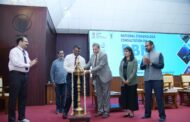Mumbai, April 28: Union Minister for Fisheries, Animal Husbandry and Dairying, Rajiv Ranjan Singh inaugurated and laid the foundation stone for key fisheries projects worth ₹255 crore during the Coastal States Fisheries Meet held today in Mumbai. The event, which witnessed wide participation from all coastal states and Union Territories, marked a significant step in strengthening India’s fisheries sector.
In his address, Shri Singh announced the establishment of the Regional Fisheries Council and highlighted the substantial progress made under flagship schemes like the Blue Revolution, the Pradhan Mantri Matsya Sampada Yojana (PMMSY), and the Fisheries Infrastructure Development Fund. He emphasized the urgent need to tap into India’s vast marine resources, especially in the Lakshadweep and Andaman & Nicobar Islands, and outlined initiatives such as the deployment of artificial reefs, development of climate-resilient coastal villages, provision of safety transponders, expansion of mariculture and seaweed farming, and issuance of Kisan Credit Cards to fishers. Singh underscored the importance of Centre-State cooperation in driving growth and promoting sustainable practices in the sector.
The event was also graced by Ministers of State for Fisheries, Animal Husbandry and Dairying, Prof. S.P. Singh Baghel and George Kurian, along with fisheries ministers from Maharashtra, Gujarat, Goa, and Karnataka. Senior officials from the Department of Fisheries, state fisheries departments, ICAR Institutes, and the Bay of Bengal Programme (BoBP) were in attendance.
Prof. S.P. Singh Baghel lauded the achievements under the Blue Revolution and PMMSY, noting that India has become the world’s second-largest fish producer. He highlighted that strategic investments in infrastructure and innovative farming methods had doubled fish production and boosted exports. Prof. Baghel also called for greater use of digital platforms and further empowerment of women in the sector.

Shri George Kurian emphasized the need for strong Centre-State collaboration to harness the “blue economy,” referring to Prime Minister Narendra Modi’s vision of the “blue chakra.” He pointed to departmental initiatives that have not only strengthened fisheries but also improved nutrition and livelihoods for nearly 30 million people. Kurian outlined future plans including expanded artificial reef deployment, distribution of 1 lakh safety transponders to fishermen, and the development of 100 climate-resilient coastal villages.
Dr. Abhilaksh Likhi, Secretary, Department of Fisheries, reported a 9.8% sectoral growth since 2014-15. He urged the harnessing of underutilized resources along India’s 11,000 km coastline and Exclusive Economic Zone, especially the tuna-rich waters of the Andaman & Nicobar Islands and Lakshadweep. Dr. Likhi stressed the need for infrastructure upgrades, smart harbour development, and modern regulatory frameworks to meet contemporary challenges.

The Coastal States Fisheries Meet 2025 featured several technical sessions focused on marine governance, mariculture standard operating procedures, export promotion, traceability, and strengthening safety mechanisms at sea. Discussions centered on bridging infrastructure gaps, resource management, promoting sustainable fishing practices, and adopting innovative solutions to enhance market linkages.
The meet provided a vital platform for Fisheries Ministers, officials, and stakeholders to share insights, celebrate successes, and strategize solutions to ongoing challenges. With a focus on innovation, governance, and collaboration, the gathering reaffirmed the sector’s critical role in enhancing livelihoods and contributing to sustained economic growth in India’s coastal regions.





